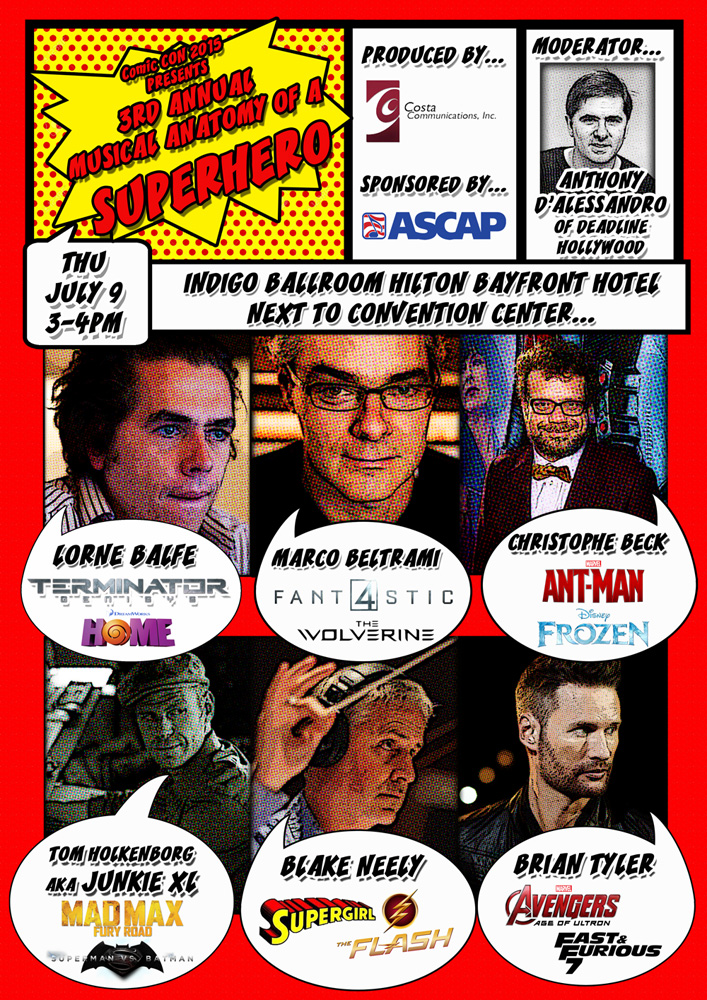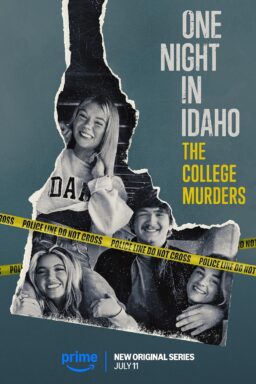“So, who dressed up as John Williams today?” moderator Anthony D’Alessandro of Deadline Hollywood asked the audience. He was kidding. Some San Diego Comic-Con attendees dress as superheroes or characters from television, anime, or video games, but no one puts on a composer costume, even to try to emulate the legend who created the music for “E.T.,” “Jaws,” and “Star Wars.” Still, there were so many people who wanted to hear from the composers of superhero movie scores that one of the largest rooms available was packed. And even the attendees in superhero attire knew that the soaring music is as important to creating the impact of those movies as it is from the stunts and special effects.
Williams’ name came up again during the question and answer session, when the composers were asked about their influences and inspiration. Christophe Beck (“Edge of Tomorrow,” “Frozen,” “Ant-Man”), Marco Beltrami (“Snowpiercer,” “Wolverine,” “Fantastic Four”), Brian Tyler (“Avengers: Age of Ultron,” “Furious 7,” “Thor: The Dark World”), Blake Neely (“Super Girl,” “Arrow,” “Flash”), and Junkie XL (“Mad Max: Fury Road,” “Batman v. Superman”) all agreed that the theme to “Star Wars” was essential in showing them what they wanted to do. Junkie XL (born Tom Holkenborg) got a laugh from the crowd when he talked about another major influence in his life: Pink Floyd’s “Dark Side of the Moon,” which he got as a gift from a “cool” teenage relative when he was just six years old. He was so impressed with it that he brought it to school to play to his class, and got in trouble when the track he selected brought some of his classmates to tears.
The composers work on a wide range of genres, but all of them spoke with great affection about their work with superheroes. Neely, who is currently working on three comic book-based television series, said he wished he could write for every DC superhero. With “Supergirl,” he is for the first time writing for a woman with superpowers. She is also a cousin of Superman and while she is a very different character, the music for the series has to reflect her relationship to one of the original and iconic super-characters. That also gives him a chance to “do something traditional” to pay homage to Williams himself, who created the iconic theme for the Christopher Reeve “Superman” film. But the “Supergirl” score also has a “light, female voice, not as dark and masculine” as the ones he did for “Flash” and “Arrow.” He likes to reuse music cues to help create a consistent identity for the score, but he noted ruefully that whenever he does, he hears about it from the fans via Twitter. His “really geeky” secret: for the first few episodes, all of his “Arrow” music was in the keys of A, A flat, and A sharp. “And you can guess the keys I picked for ‘Flash!’”
Tyler talked about putting several superheroes who already have established musical themes into one movie in “Avengers: Age of Ultron.” Two were his own, for Thor and Iron Man. But this film added some new characters, including Quicksilver and Scarlet Witch. “Natasha and the Hulk have a new relationship,” and, like a new character, there had to be music to express that as well. Echoing the comments of the other panelists, he said the score has three different goals: “to connect to what the audience knows, do something new, and add something out of the box.”
We heard Beltrami’s stirring new score for the new “Fantastic Four” movie, co-created with innovative composer Philip Glass. While this score will be “darker” than in the earlier films, he said the most important goal was to capture “the innocence and curiosity of the kids” who get exposed to interstellar radiation and become superheroes. “There’s no overall Fantastic Four theme,” he said, “just individual elements that come together.”
“Can you come to Australia right now?” Junkie XL’s agent asked him. “George Miller wants to talk to you.” Three hours later, he was on an 18-hour flight to meet with Miller about “Mad Max: Fury Road.” And the first scene Miller showed him was the red jump-suited guy with the flaming guitar. “The whole movie was visceral and aggressive and over the top,” Junkie XL said. So, he and Miller decided they would create a rock opera, with two hours of continuous music. He loved writing for Furiosa, the character played by Charlize Theron. “She’s a strong character and she needed strong music.” That meant 28 brass players, including 12 French horns. Their sound was so powerful it distorted the microphones, but that was fine. “I was not looking for a very clear sound.”
This might have been the only group attending Comic-Con who were more excited about the music for the new “Ant-Man” movie than the special effects. Both got a lot of appreciation when the panel showed an exciting clip from the new Paul Rudd film, scored by Christophe Beck. He described the process of working in Marvel’s complicated universe as “pure chaos and confusion from beginning to end,” with “not just tweaking in the last few weeks, but major shifts.” But he said he would do it all again in a minute.
The composers talked about bringing in unusual sounds and instruments. The “Snowpiercer” score included train tracks. Someone mentioned a didgeridoo, and another one brought up bagpipes. Beltrami has a wind harp on his house. But often the answer is just a better understanding of what is already available. Junkie XL was not classically trained but he wanted a more traditional sound for the upcoming “Black Mass,” with Johnny Depp as real-life criminal Whitey Bulger. So he invited a cellist to spend a couple of days with him to teach him about the instrument and how to communicate what he wanted it to sound like. They all agreed that a great musician can make any instrument work.
And they all agreed that they are lucky to work with this generation of producers and executives, who grew up with the music of John Williams, and so come to them wanting movie music that is “beautiful, grand, and heartbreaking.”












